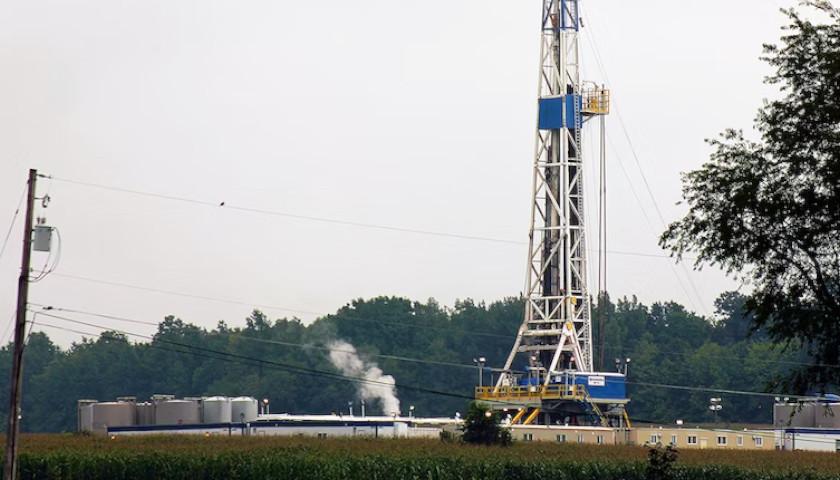While Democrats insist Pennsylvania misses out on revenue from natural gas extraction, a Pittsburgh nonprofit’s analysis published on Thursday observes drilling impact fees yielded $2.25 billion through 2021.
Since the boom in hydraulic fracturing (or fracking), the horizontal drilling technique gas companies use to access the vast reserves of fossil fuel from the Marcellus Shale sedimentary rock formation, many politicians have eyed an extraction tax. Instead of such a tax, former Governor Tom Corbett (R) and a Republican-led legislature levied an impact fee in 2012, with revenues going to localities largely to mitigate fracking-related environmental disruption. In the new policy brief from the Allegheny Institute (AI), the think tank’s executive director Frank Gamrat detailed those revenue gains.
As of last year, the fee was based on a natural-gas selling price of $6.64 per million British thermal units, a price that has gradually risen over time. The fees coming to Pennsylvania communities averaged well over $200 million per year, with last year’s amount coming to $234.44 million. Given selling prices, localities are poised to receive record fee revenues next month for fracking conducted last year.
The state itself gets $25.5 million from the fee paid by Pennsylvania’s eligible gas wells. Sixty percent of the remaining funds get disbursed through the Unconventional Gas Well Fund, benefiting counties and municipalities with drill sites. The rest of the money goes to the Marcellus Shale Legacy Fund, which aids highway and bridge improvements and various environmental purposes, including some overseen by all counties regardless of whether or not they have natural-gas wells.
Just in Allegheny County, which hosted 160 eligible wells as of 2021, municipal revenue gains from the impact fee totaled $6,324,792 between 2015 and 2021. The money has funded numerous projects concerning environmental improvement, stormwater systems, water preservation, social services, the judiciary and planning initiatives, and career and tech centers.
Still, Democrats hope to use their new majority status in the state House of Representatives to advance legislation to study the possibility of a severance tax to generate even more government funds. That resolution’s author, Representative Mandy Steele (D-Cheswick), may soon get a House vote for her measure.
In a memorandum describing the legislation, Steele wrote she wants the Legislative Budget and Finance Committee to conduct an audit to determine how much revenue the state loses without an extraction tax.
“Not only do oil and gas companies not pay any local property taxes and very little in state taxes, but the impact fee also allows the oil and gas companies to pay significantly less than if a severance tax was imposed,” she wrote. “Further, no other state uses the per-well fee method in impact fees…. It is time we know exactly how much money our state is losing by not imposing a severance tax.”
The Marcellus Shale Coalition, an association advocating for the gas drilling industry, responded to her legislation this week by warning lawmakers that the resolution will compromise job creation and energy production. The group also disputed that its member companies somehow underpay the state.
“The very premise of HR 131… is to suggest that the natural gas industry — and by extension, those it employs — have not paid their ‘fair share,’ whatever that overused term has come to mean,” coalition President Dave Callahan wrote. “To be clear: we believe that paying over $2.5 billion in a new, unique tax on an industry, in addition to billions of dollars in revenue generated by paying every other tax that Pennsylvania levies on businesses, is more than fair compared to every other business interest operating in the Commonwealth.”
In an interview with The Pennsylvania Daily Star, Gamrat also took issue with the suggestion that natural gas companies pay “very little in state taxes.” He noted that although Pennsylvania is now gradually lowering its corporate net income tax, which natural gas drillers pay, the levy currently stands at 8.99 percent, the second-highest state business tax rate in the U.S. (It was 9.99 percent before the phase-down began this year.)
Gamrat also pointed out that while gas extractors don’t pay real-estate taxes on lands where they drill insofar as those lands are leased, some of the royalties that accrue to the property owners flow to the government via the state income tax.
“The gas companies are putting a significant amount of money into the Pennsylvania economy in addition to the impact fee,” he said.
Gamrat said that while it is unclear whether the state could generate higher revenue from a severance tax, the proposition bodes ill for job creation and energy production. He suggested companies may even leave the state entirely if Pennsylvania’s severance charge exceeds those of Ohio and West Virginia, states into which the Marcellus and Utica shales extend. The Keystone state outproduces both of those neighbors currently, but he said that could change depending on future policy.
“Obviously when you tax something you get less of it,” he observed.
He added that whatever programs could gain money from a drilling tax, that levy would not serve the essential purpose of the impact fee which has allowed communities where extraction takes place to counteract environmental effects. A new tax, he argued, would function as a “blank check” for state lawmakers.
“The impact fee is designed to go to where the industry is and is having impacts,” he said. “When you talk about the severance tax…, it’s no longer pegged to those communities. It’ll now go into, most likely, the general fund or some special-interest area where they can then get that money and manipulate it.”
– – –
Bradley Vasoli is managing editor of The Pennsylvania Daily Star. Follow Brad on Twitter at @BVasoli. Email tips to [email protected].





